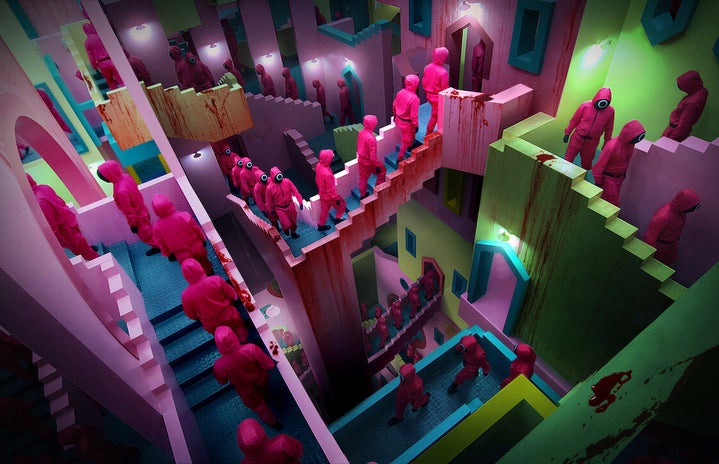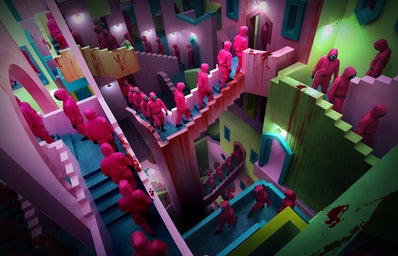If there is one thing to be learned after Squid Game’s astronomical success during the past few weeks, it’s that this is one of those shows I’d definitely wouldn’t want to be in. Although the critic on how capitalism simulates the idea of free will is explicit throughout the drama and connected to our current reality – for show creator Hwang Dong-hyuk himself told Variety he wanted to write an allegory on the modern capitalist society and its extreme competition of life -, I would say it’s pretty far fetched that I would manage to live in that alternative universe. For one, I’d probably get my hands sweaty and ruin the Dalgona candy game completely. And I’m giving myself enough credit on this one by entertaining the idea that I would even survive the first round. Seriously.
However, while the world of fiction merely presents itself for our delight and is still untouched by our own lives, here are five other Asian productions, from K-dramas to books, also packed with adrenaline and a little bit of intense competition, deathly games, apocalypses and everything in between. Only, the catch is: though addicting, you’d probably not want to be there with your favorite characters either.
- Sweet Home (스위트홈)
-
Sweet Home is a South Korean apocalyptic drama, inspired by Kim Carnby and Hwang Young-chan’s webtoon of the same name and released through Netflix. After suicidal teenager Cha Hyun-soo (Song Kang) moves into the apartment complex Green Home, a mysterious disease starts to spread in the outside world that turns people into monsters. Trying to survive, the residents of Green Home lock themselves in, only to discover – you guessed it – the monsters are within the walls as well. With strong female characters, a pinch of family drama for context and a few tear-jerking scenes, Sweet Home is binge-worthy and a treat. For viewers, of course.
- Battle Royale, by Koushun Takami
-
One of the inspirations behind Hwang’s Squid Game and a movie adaptation the acclaimed director Quentin Tarantino himself wish he made, Battle Royale is the only novel written by Japanese journalist Koushun Takami, in 1999. It was initially rejected by 1997 Japan Horror Fiction Awards but went on to become a best-seller and, since the film release, became a pop culture staple by coining the term “battle royale” to refer to pieces where humans are instructed to kill each other to survive.
Set in 1997 Japan, a fictional fascist government controls its society through censorship and cult of personality by a strong leader. As a part of their military program, fifty classes of high school juniors are randomly picked and kidnapped, being dropped into a remote location and forced to kill each other until one student remains. Narrating each character’s struggle, from rockstar wannabe Shuya to sociopath Kazuo, the book is a complex narrative that tackles not only the disturbing search for survival but also the progressing of personal bonds, from before the competition, during, and after the scars of the game.
- Train To Busan (부산행)
-
Starring Squid Game’s own “hot man from the subway station”, also known as South Korean actor Gong Yoo, Train To Busan is an action horror film directed by Yeon Sang-ho. It premiered in the Midnight Section of the 2016 Cannes Film Festival and went on to become the highest grossing Korean movie of the year, recording over 11 million theatregoers that year.
Depicting a zombie apocalypse being spread across South Korea, Train To Busan is centered around a train’s passengers’ search for safe haven in Busan, a city on the coast of the country turned into a quarantine zone. Among them is divorced father Seo Seok-woo (Gong Yoo), who, alongside other travellers like working-class man Yoon Sang-hwa and high school baseball player Min Yong-guk, fights to survive and protect his daughter as infection begins aboard.
If you enjoyed Squid Game, Train To Busan will definitely be the right dose of adrenaline for you – and also, unexpectedly, will leave you reaching for a tissue from time to time.
- Alice In Borderland (今際の国のアリス)
-
Japanese thriller Alice In Borderland is a live-action adaptation of the homonym manga by Haro Aso. The dorama tells the story of addicted gamer Arisu and his two friends, who find themselves in a parallel, abandoned version of Tokyo and are forced to compete besides strangers in life-threatening games to survive. With elements drawn from Alice In Wonderland and post-apocalyptic dystopias, Alice In Borderland is filled with plot twists and turns and nerve-racking competitions, within the game and out of it as well. With stars like Kento Yamazaki and Tao Tsuchiya on the cast and positive critical feedback, a season two is promised and supposedly in the works, even though there is no date set for its release.
- Girl From Nowhere (เด็กใหม่ The Series)
-
A seemingly normal school day in Thailand begins as transfer student Nanno gets to meet her new peers. Past introductions and formalities, unusual things start to happen when she discovers secrets and misdeeds of her new friends – and takes upon herself the role of bringing down karmic wrath on them.
Ruthless, Nanno seeks to enforces justice upon wrongdoers, being an avenger by trapping them into making bad choices to pay for their mistakes. And the cycle never ends, because, after ruining lives in a justifiable yet evil way, Nanno transfers schools and a new person is met with their deranged, fair match.
The Thai television series Girl From Nowhere was created by SOUR Bangkok studio and is a mystery thriller. It has been acclaimed for its unusual storytelling and lack of plot, as well as its criticism of real life events such as the story of “Minnie and the Four Bodies”, based on a famous Thai hit-and-run case.
The show does have triggers and sensible topics that could be taxing to viewers; those are listed per episode here.







